On the afternoon of June 24, 2025, the 2025 International Summer School hosted by the Department of Electronic Engineering at Tsinghua University officially kicked off at the Electronic Engineering Building. Over 30 international students from 12 renowned global universities—including partner institutions such as Nanyang Technological University (Singapore), Chulalongkorn University (Thailand), University of Notre Dame (USA), Hamad Bin Khalifa University (Qatar), and Technion (Israel), as well as applicants from MIT (USA), University of Ottawa (Canada), and the University of Copenhagen (Denmark)—along with outstanding high schools in countries like Singapore and the United States, gathered at Tsinghua for a two-week academic journey themed AI+ for Urban Sustainability.
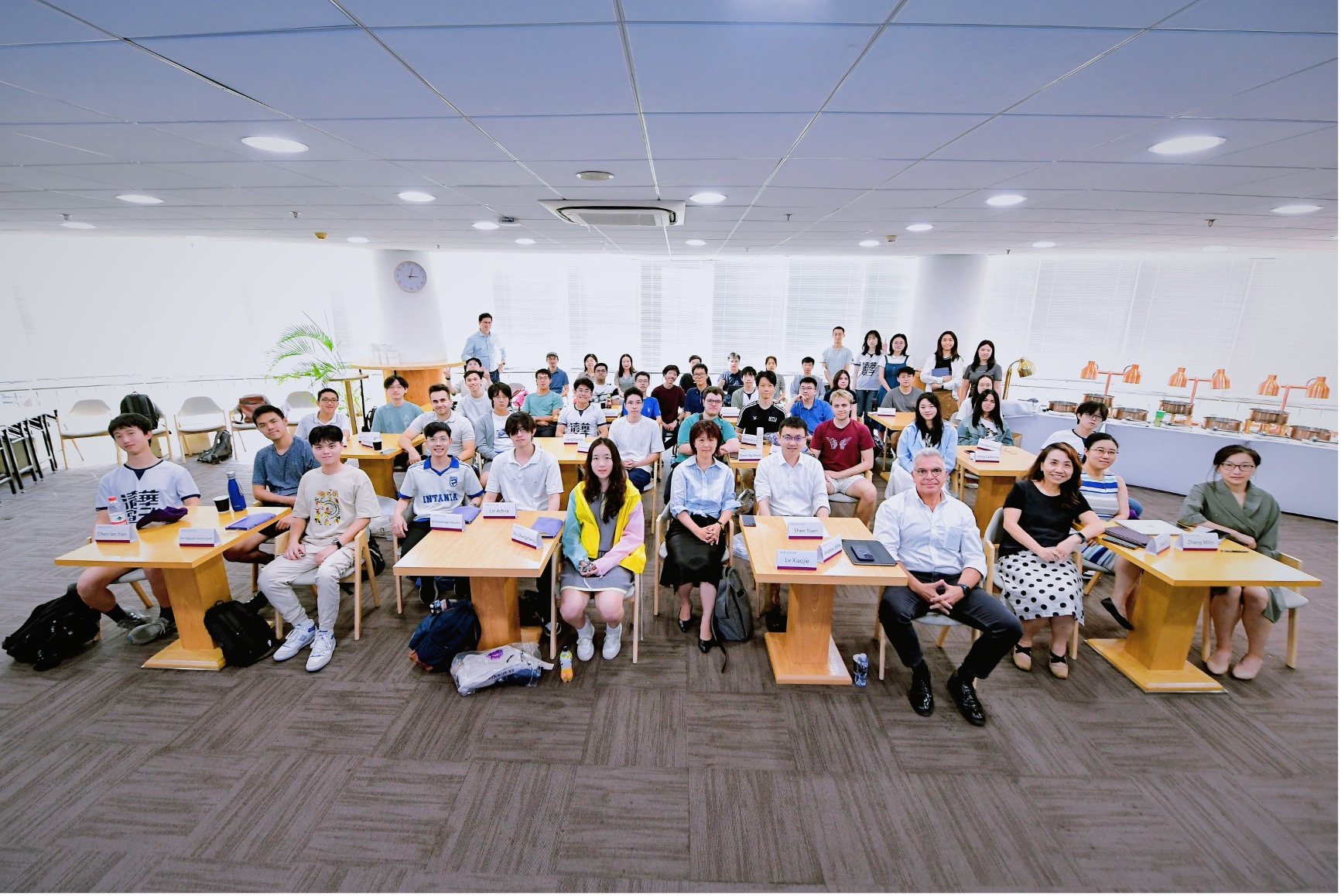
At the opening ceremony, Prof. Shen Yuan, Council Director of the Department of Electronic Engineering, extended a warm welcome to the students from around the world. He emphasized the department's commitment to fostering interdisciplinary integration and global collaboration to drive sustainable development through technological innovation. Reflecting on the success of last year's inaugural summer school held in partnership with Nanyang Technological University, Shen shared his expectations for this year's participants: to explore AI applications in smart city development, investigate the potential of biochip technology in reducing global healthcare costs, and draw inspiration from China's carbon neutrality practices to develop innovative solutions for worldwide sustainability challenges. This year's program will further strengthen international academic exchange and cultivate future innovators with a global perspective.
Prof. Xiaojie Lv, Deputy Director of Tsinghua University’s Office of International Cooperation and Exchange, highlighted Tsinghua’s century-long development, its diverse body of international students, and the strength of its global faculty. With over 3,000 international students from various cultural and academic backgrounds, Tsinghua has built a vibrant and multicultural academic community. Its world-class international faculty bring cutting-edge academic insights and research methodologies, showcasing Tsinghua’s openness and global influence as a top university.
Prof. Yilin Zhang, Assistant to the Department Chair for International Affairs at the Department of Electronic Engineering, introduced the department’s development history, academic achievements, and distinctive curriculum system. From its founding to its major milestones across different eras, she emphasized key programs such as robotics and robotics and unmanned aerial vehicle (UAV) design challenges, as well as joint training programs with global universities, reaffirming the department’s mission to cultivate tech leaders who can tackle global challenges.
Dr. Yi Jiang, Executive Director of the Sustainable Innovation Initiative at the Department of Electronic Engineering, provided an overview of the summer school, which is structured around the theme of “AI + Sustainability.” The program integrates academic lectures, industry visits, and cultural exchanges to foster globally minded, interdisciplinary talents.
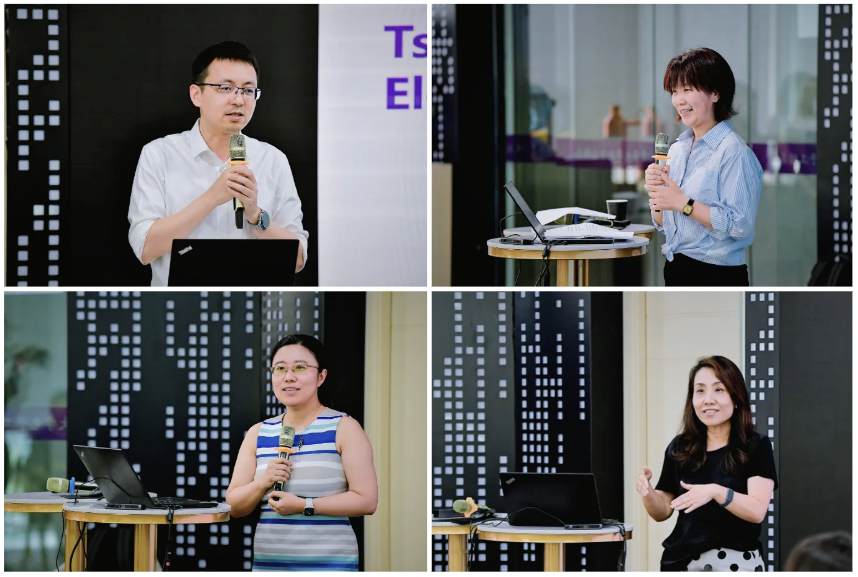
From Left to Right, Top to Bottom:
Yuan Shen, Xiaojie Lv, Yilin Zhang, Yi Jiang
[Opening Lecture and Lab Visits]
Following the ceremony, the first themed lecture commenced with a keynote by Andrew Miles, former President of Sam’s Club China. In his talk titled “The Future of Retail”, he explored how AI is reshaping the retail ecosystem. He argued that future retail will extend beyond product sales to foster emotional engagement, personalized services, and trust-driven customer relationships through AI and digital technology. Examples included personalized product recommendations based on shopping habits and immersive shopping environments enabled by digital technologies.
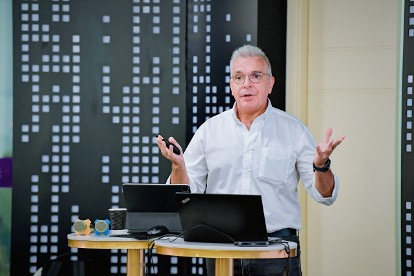
Andrew Miles Lecture
After the talk, students, guided by faculty and student ambassador, toured the Department’s history museum. Exhibits vividly portrayed the department’s journey from humble beginnings to scientific leadership, through old photographs and historical artifacts. Students listened attentively and engaged in discussions, expressing deep appreciation for the pioneering spirit of generations of Tsinghua engineers.
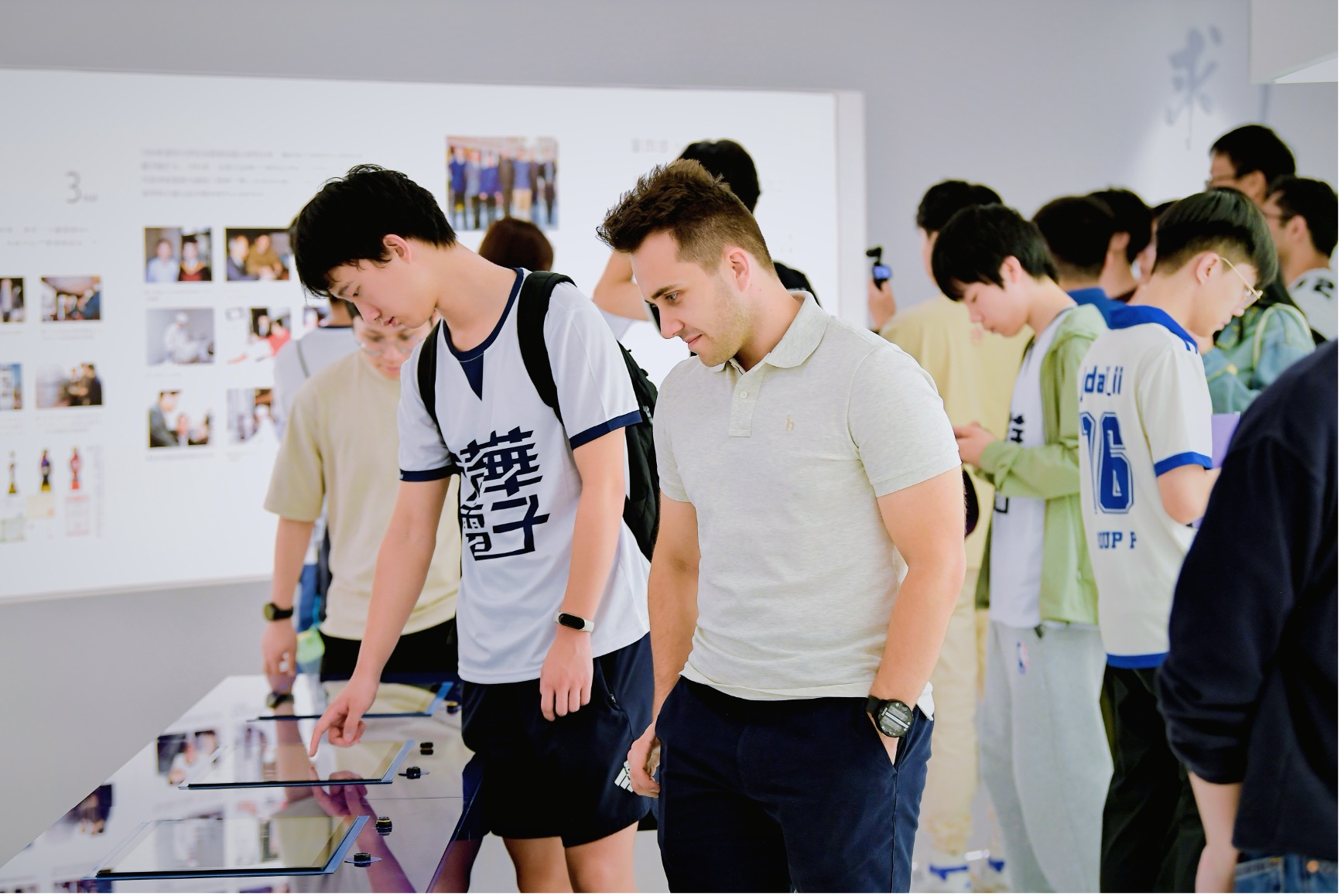
Department History Museum Visit
In the lobby of the Electronic Engineering Building, Ph.D. student ambassadors introduced the City Simulator Platform, which integrates infrastructure and human behavior to model complex urban interactions and support sustainable urban development. Students gained deeper understanding of the platform’s capabilities and its future applications.
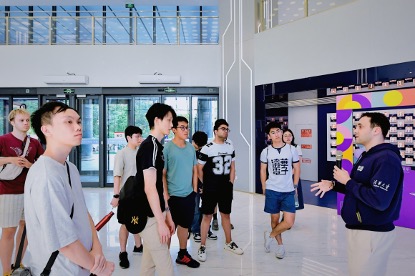
City Simulator Introduction
Students also visited the Microwave Anechoic Chamber located three floors underground. Dr. Shenheng Xu, Deputy Director of the Microwave Institute, explained that the facility measures antenna and communication system performance across 0.01–500 GHz. It serves as a 5G base station OTA testing lab and is certified by CNAS, and has played a key role in the commercial deployment of 5G in China. The visit gave students a hands-on understanding of electromagnetic measurement technologies.
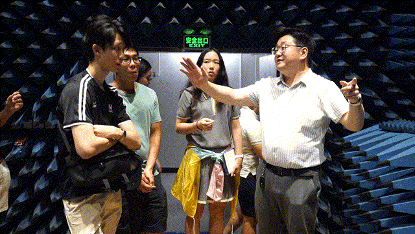
Microwave Chamber Tour
[Cross-Cultural Ice-breaking]
Following a relaxed and cheerful welcome dinner, the summer school held an ice-breaking session organized by student ambassadors from the Department of Electronic Engineering. Student ambassador representatives Qi Sun and Yijun Xiao hosted the activity. Students from different countries and regions were grouped together to introduce themselves, and took part in interactive games such as Pictionary and cultural trivia, along with talent showcases. These activities quickly fostered a positive atmosphere of cross-cultural exchange and teamwork. The room was filled with laughter, radiating youth and vitality. Through the games, students deepened their understanding of one another and began building new friendships.
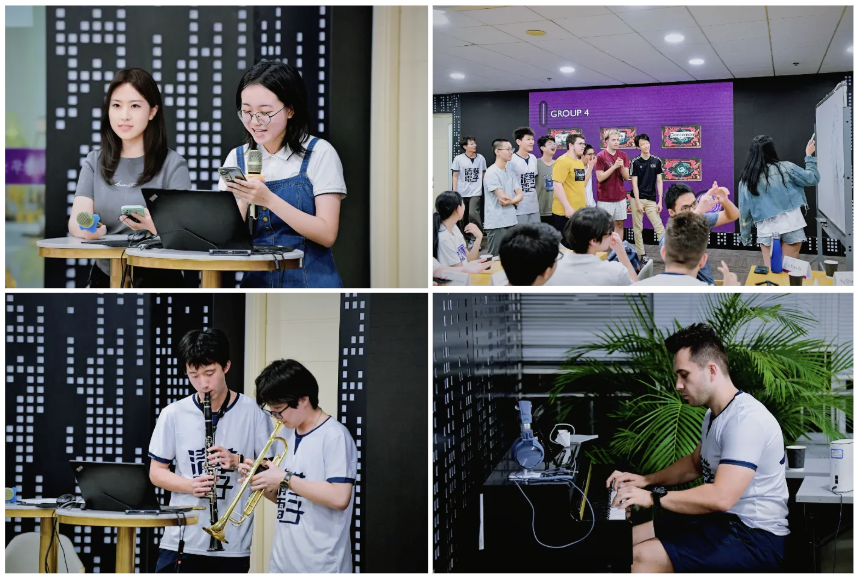
Ice-breaking Activities
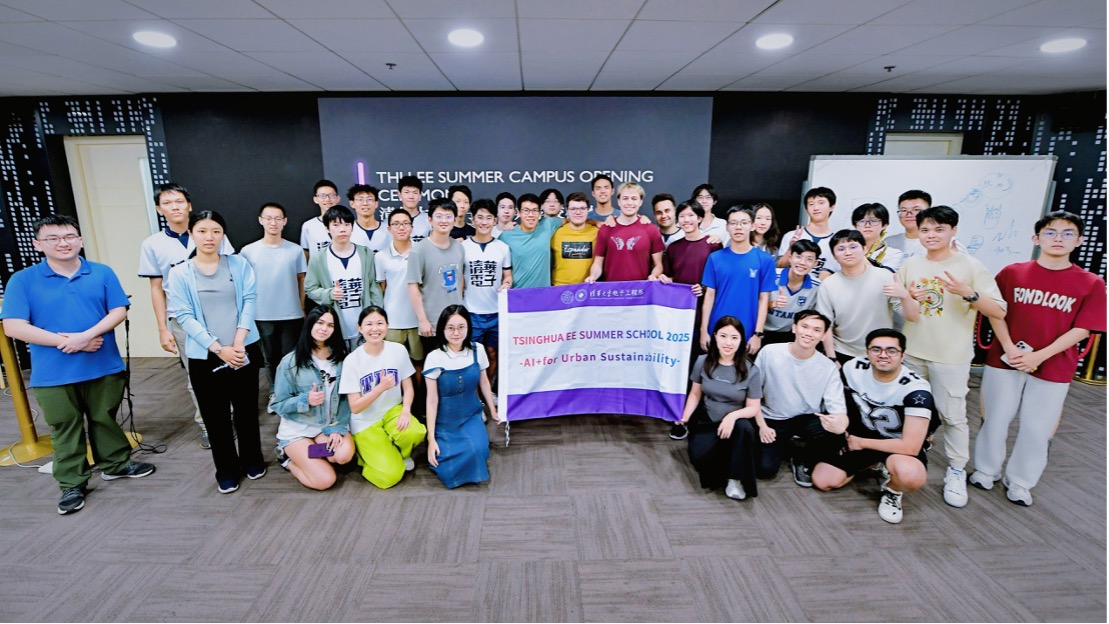
Group Photo of Summer School Students and Student Ambassadors
[Curriculum and Highlights]
This year’s summer school focuses on four major themes: Smart Cities, Good Health and Wellness, AI Models and Chips, Sustainable Business and Green Industry. Activities are structured across three dimensions:
1. Frontier Courses: Delivered by professors and guest experts, offering cutting-edge academic knowledge.
2. Industry Practice: Site visits to enterprises and research institutions to observe real-world applications of AI in manufacturing, diagnostics, etc.
3. Cultural Immersion: Engaging experiences in Tsinghua’s campus life and traditional Chinese culture.
Featured events also include a “Global Admissions Info Session” by the Department of Electronic Engineering and the co-hosted “Green Future Challenge” (in partnership with Tsinghua Institute of Electronics in Tianjin, Temasek Foundation, and Vertex Ventures China), showcasing Tsinghua’s achievements in innovation, technology, and education.
[Student Ambassador Program]
The smooth execution of this summer school is made possible by dedicated support from over 10 student ambassadors recruited by the department. They fulfill three roles:
l Tech Pioneers: Driving innovation and coordinating lab/enterprise engagement
l Cultural Envoys: Promoting Tsinghua’s humanistic values and guiding cultural experiences
l Campus Partners: Supporting extracurricular activities and fostering a collaborative community
The Student Ambassador Program aims to cultivate global competence among Tsinghua students. Through training in organization, cultural communication, and hospitality, ambassadors help create a warm, open, and collaborative atmosphere for international students.
[Looking Ahead]
In the coming two weeks, global youth will engage in academic and cultural exchanges that contribute to building a smarter and more sustainable future.
Contributors: Qi Sun, Yijun Xiao